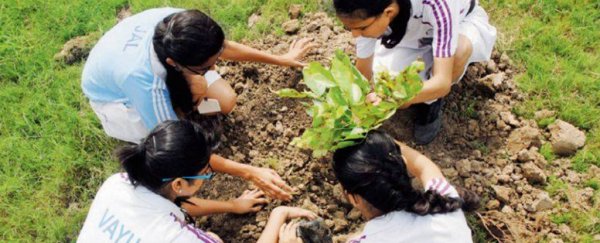To encourage all students to get an education, even if their parents can't afford it, a primary school in the Indian state of Chhattisgarh is asking parents to simply plant a tree sapling instead of paying school fees.
The parents have to take care of the sapling and plant a new one if it dies - but compared to the cost of traditional school fees, it's a small price to pay. And it comes with the added bonus of helping to improve local air quality.
The school is Shiksha Kuteer in the city of Ambikapur in the east of the country. According to Asian News International, at least 35 students between the ages of four and five are studying there.
The initiative was set up by a group of local professionals and business owners in response to India's skyrocketing education fees.
 Asian News International
Asian News International
Currently, the government spends just 3.9 percent of its budget on education, which means parents are left to pay for hefty school fees, as well as paying for books and school supplies.
A national survey released last year showed that between 2008 and 2014, private expenditure has increased by 175 percent to Rs6,788 per student each year (US$100). That might not sound like a lot, but for many families - particularly in rural regions - it's not affordable, especially at the primary school level.
"In Delhi alone, the average expenditure on general education has grown three times since 2008," Maria Thomas wrote for Quartz last year.
"This starts right from the nursery level, with parents spending more money on donations and fees than the cost of degrees at Delhi University and even some management institutes."
The lack of government spending is also damaging the education system too. The 2014 Annual Status of Education report found that nearly 20 percent of grade 2 students, aged seven or eight, didn't recognise the numbers between one and nine.
But by offering an affordable way to get students into schools, Shiksha Kuteer is encouraging education for everyone.
So far, the school has received an overwhelming response, and 700 saplings have been planted across the village over the last year.
"Shiksha Kuteer has opened in the village for students who are poor and have no money to pay fees," local villager, Sevak Das, told Asian News International.
"Students are being taught in English medium. They are being taught till a certain standard and their guardians have been asked to plant saplings instead of paying fees."
This is just one small in a small village in India, but if the approach works, it could be something that other schools look into. And it can't hurt, because every day, air pollution becomes a worsening problem in many parts of India.
Last month, Delhi's air was so toxic that its schools had to shut down.
While a few trees aren't going to solve that problem any time soon, making families plant and take care of a tree - and replace it if it dies - is a way to encourage positive air-purifying action, as well as helping to educate the next generation.
